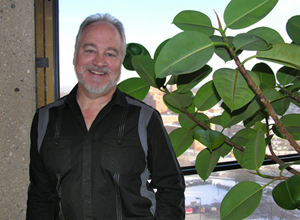Meet EPA Scientist Jay Garland

The challenges to long-duration space travel are enormous. Scientist Jay Garland Ph.D. spent twenty years at NASA trying to figure out how astronauts could stay in outer space for a long time without needing more supplies. Now he is bringing the same concepts of reusing and recovering resources to his research at EPA.
What does space travel have to do with protecting human health and the environment?
I’m looking at new ways to reuse wastewater by thinking of it not as a waste, but as a resource to recover water, energy, and nutrients. That’s where my background at NASA comes in. When you’re thinking about spending a long time in space, there can’t be any waste. You have to recover, recycle, and reuse everything.
Why is water recovery important?
Water is a finite resource. We have more and more people on earth using the same amount of water. We also tend to live in areas where water availability is decreasing. In the U.S., there has been a large shift in population to areas where there is less and less water, like the southwest. There are even more water stressed areas across the world. It’s important for us to recover and reuse wastewater as much as we can.
Our current methods for dealing with water rely on large, centralized treatment facilities and large networks of piping—last century’s infrastructure. It’s a network that EPA estimates will cost hundreds of billions of dollars to maintain over the next several decades.
Given the costs of maintaining that system and the long-term nature of investing in infrastructure, the systems we put in place now are going to have long-term impacts on the future. Do we want to think about systems that look at water, energy, and nutrients in a different way?
Give us some examples of wastewater recovery and reuse.
One of the things we’re doing here at EPA’s facility in Cincinnati is installing systems to collect the shower water from our gym. It represents a pretty large flow of wastewater in our building, and the water is relatively clean compared to water being flushed from a toilet. If we can process that water to a sufficient degree, it can be used for non-potable uses such as toilet flushing. In some buildings, that would increase water use efficiency by 25-30%.
Dirtier wastewater is higher in organic material that could be used for energy. Nutrients that we now consider contaminants could be recovered and reused for agriculture.
What do you like most about your research?
I worked a long time with NASA and that was very interesting work. When people asked you what you did, it was cool to say “I work on systems for living on the moon or Mars.” It got their attention. But, in the end, I realized it wasn’t going to happen in my lifetime, so I decided I had to focus on Earth if I was going to try and make a difference. I came to the EPA to change the world, and I feel like I have more of an opportunity to change the world here than I did when I was working on space.
If you could have dinner with any scientist, past or present, who would you choose and what would you ask him or her?
I like to host dinner parties, so I would invite a group. I’d invite John Todd, an ecological engineer and Wendell Berry, a poet and farmer who looked for solutions that solve multiple problems, while minimizing the creation of new problems. I would also invite some of the people responsible for maintaining and operating our infrastructure, so maybe some of the people from our local sewer and water district in Cincinnati. We would sit down over dinner and talk about how we can do things differently, what the limitations are, and what we need to do to change the world.
Tell us about your background.
I got my bachelors in Biology from Ohio State University and my masters in Biology from Virginia Tech University. After I got my masters, I worked at the Kennedy Space Center in Florida for a few years. My Ph.D. is in Environmental Science from the University of Virginia.
What advice would you give students interested in a career in science?
I think the biggest challenge ahead for scientists is solving problems that are interdisciplinary. I would advise students to focus hard on a particular area but make sure they try to maintain that broad perspective. Make sure they understand multivariate statistics, have the capability to process large amounts of data. We can so easily collect so much data now, the challenge is figuring out how to make sense of it.
Editor's Note: The opinions expressed herein are those of the researcher alone. EPA does not endorse the opinions or positions expressed.
